Global Talent Management Research Project: Unilever's Practices
VerifiedAdded on 2023/01/04
|9
|2646
|75
Project
AI Summary
This research project delves into the realm of global talent management, with a specific focus on the multinational company Unilever. The study aims to identify best practices in global talent management within organizations like Unilever and to assess their impact on employee productivity and retention. The project includes an introduction outlining the challenges faced by multinational companies in building a robust talent pipeline, followed by aims, objectives, and research questions. A comprehensive literature review explores the concept of talent management in international organizations, talent management practices, the impact of global talent management on employee productivity, and recommendations for improvement. The research methodology outlines a qualitative approach, employing an inductive reasoning, interpretivism research philosophy, and a descriptive design. Data collection methods involve primary research through questionnaires and secondary research utilizing various sources. The sampling method is purposive, with a sample size of 20 human resource managers. The project also addresses ethical considerations, ensuring participant confidentiality and transparency. The expected outcomes include insights into talent management practices, their effects on employee productivity, and recommendations for enhancing HRM approaches in multinational corporations. The research provides a detailed analysis of talent management strategies, their impact on employee performance, and recommendations for improvement, offering valuable insights into the field.
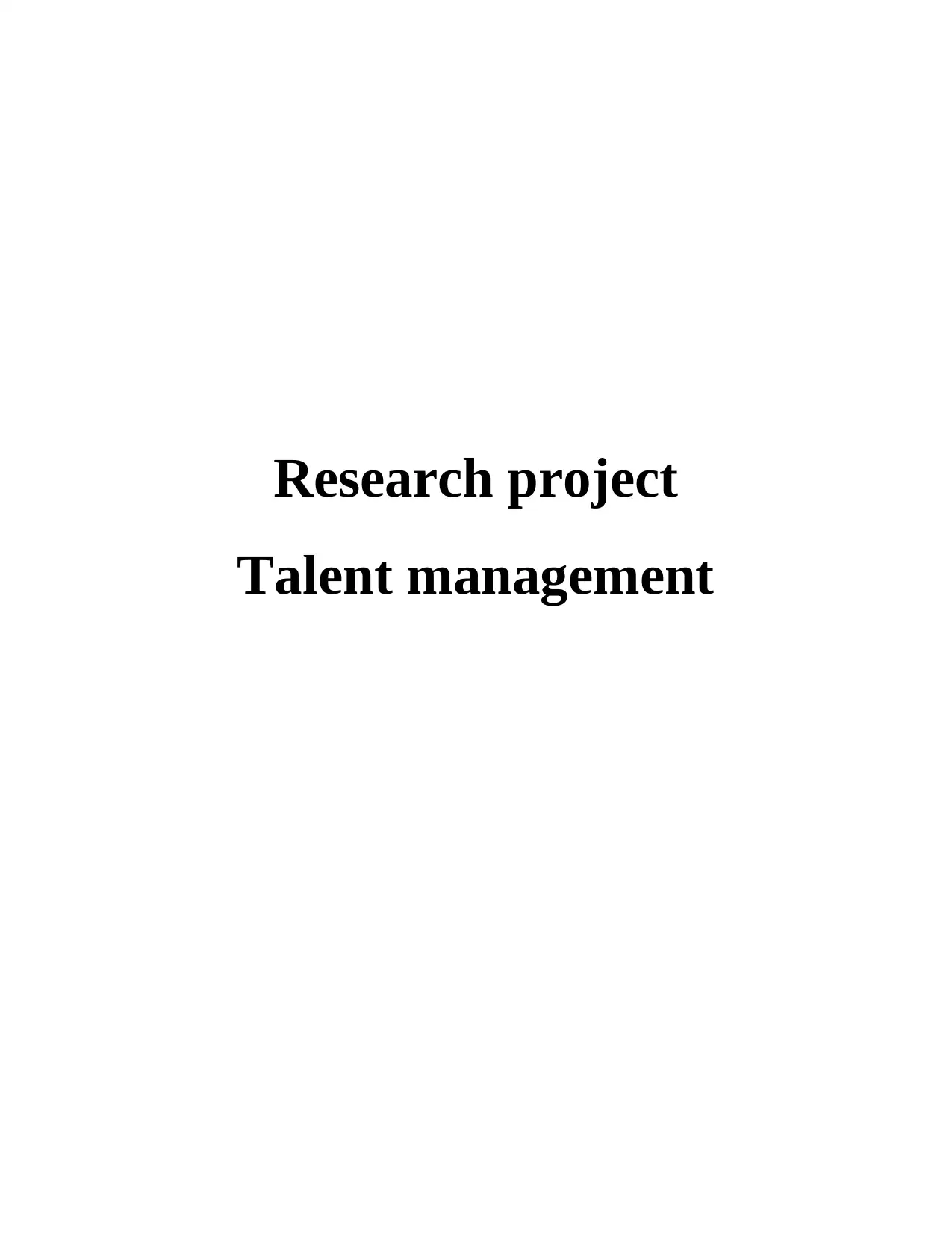
Research project
Talent management
Talent management
Paraphrase This Document
Need a fresh take? Get an instant paraphrase of this document with our AI Paraphraser
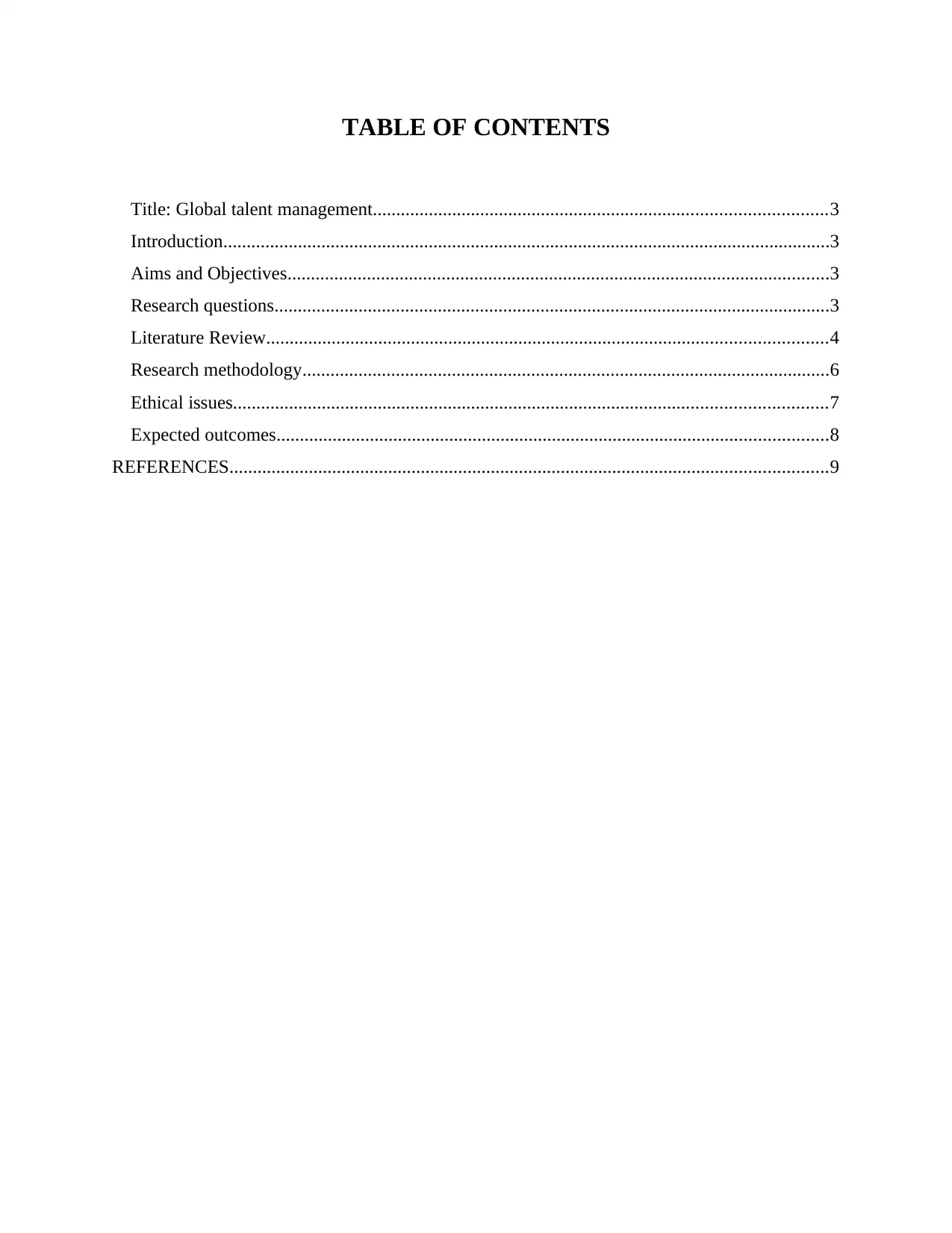
TABLE OF CONTENTS
Title: Global talent management.................................................................................................3
Introduction..................................................................................................................................3
Aims and Objectives....................................................................................................................3
Research questions.......................................................................................................................3
Literature Review........................................................................................................................4
Research methodology.................................................................................................................6
Ethical issues...............................................................................................................................7
Expected outcomes......................................................................................................................8
REFERENCES................................................................................................................................9
Title: Global talent management.................................................................................................3
Introduction..................................................................................................................................3
Aims and Objectives....................................................................................................................3
Research questions.......................................................................................................................3
Literature Review........................................................................................................................4
Research methodology.................................................................................................................6
Ethical issues...............................................................................................................................7
Expected outcomes......................................................................................................................8
REFERENCES................................................................................................................................9
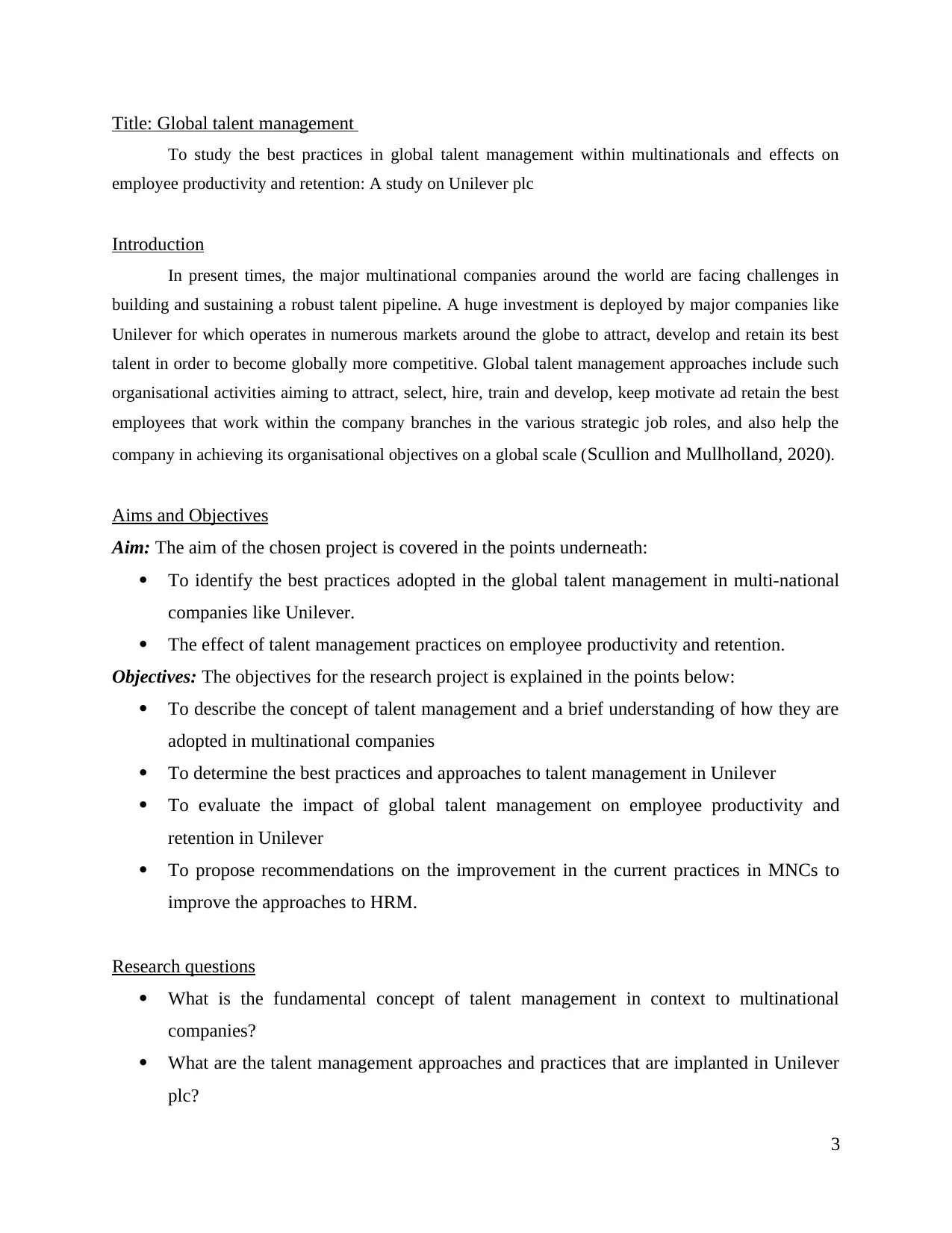
Title: Global talent management
To study the best practices in global talent management within multinationals and effects on
employee productivity and retention: A study on Unilever plc
Introduction
In present times, the major multinational companies around the world are facing challenges in
building and sustaining a robust talent pipeline. A huge investment is deployed by major companies like
Unilever for which operates in numerous markets around the globe to attract, develop and retain its best
talent in order to become globally more competitive. Global talent management approaches include such
organisational activities aiming to attract, select, hire, train and develop, keep motivate ad retain the best
employees that work within the company branches in the various strategic job roles, and also help the
company in achieving its organisational objectives on a global scale (Scullion and Mullholland, 2020).
Aims and Objectives
Aim: The aim of the chosen project is covered in the points underneath:
To identify the best practices adopted in the global talent management in multi-national
companies like Unilever.
The effect of talent management practices on employee productivity and retention.
Objectives: The objectives for the research project is explained in the points below:
To describe the concept of talent management and a brief understanding of how they are
adopted in multinational companies
To determine the best practices and approaches to talent management in Unilever
To evaluate the impact of global talent management on employee productivity and
retention in Unilever
To propose recommendations on the improvement in the current practices in MNCs to
improve the approaches to HRM.
Research questions
What is the fundamental concept of talent management in context to multinational
companies?
What are the talent management approaches and practices that are implanted in Unilever
plc?
3
To study the best practices in global talent management within multinationals and effects on
employee productivity and retention: A study on Unilever plc
Introduction
In present times, the major multinational companies around the world are facing challenges in
building and sustaining a robust talent pipeline. A huge investment is deployed by major companies like
Unilever for which operates in numerous markets around the globe to attract, develop and retain its best
talent in order to become globally more competitive. Global talent management approaches include such
organisational activities aiming to attract, select, hire, train and develop, keep motivate ad retain the best
employees that work within the company branches in the various strategic job roles, and also help the
company in achieving its organisational objectives on a global scale (Scullion and Mullholland, 2020).
Aims and Objectives
Aim: The aim of the chosen project is covered in the points underneath:
To identify the best practices adopted in the global talent management in multi-national
companies like Unilever.
The effect of talent management practices on employee productivity and retention.
Objectives: The objectives for the research project is explained in the points below:
To describe the concept of talent management and a brief understanding of how they are
adopted in multinational companies
To determine the best practices and approaches to talent management in Unilever
To evaluate the impact of global talent management on employee productivity and
retention in Unilever
To propose recommendations on the improvement in the current practices in MNCs to
improve the approaches to HRM.
Research questions
What is the fundamental concept of talent management in context to multinational
companies?
What are the talent management approaches and practices that are implanted in Unilever
plc?
3
⊘ This is a preview!⊘
Do you want full access?
Subscribe today to unlock all pages.

Trusted by 1+ million students worldwide
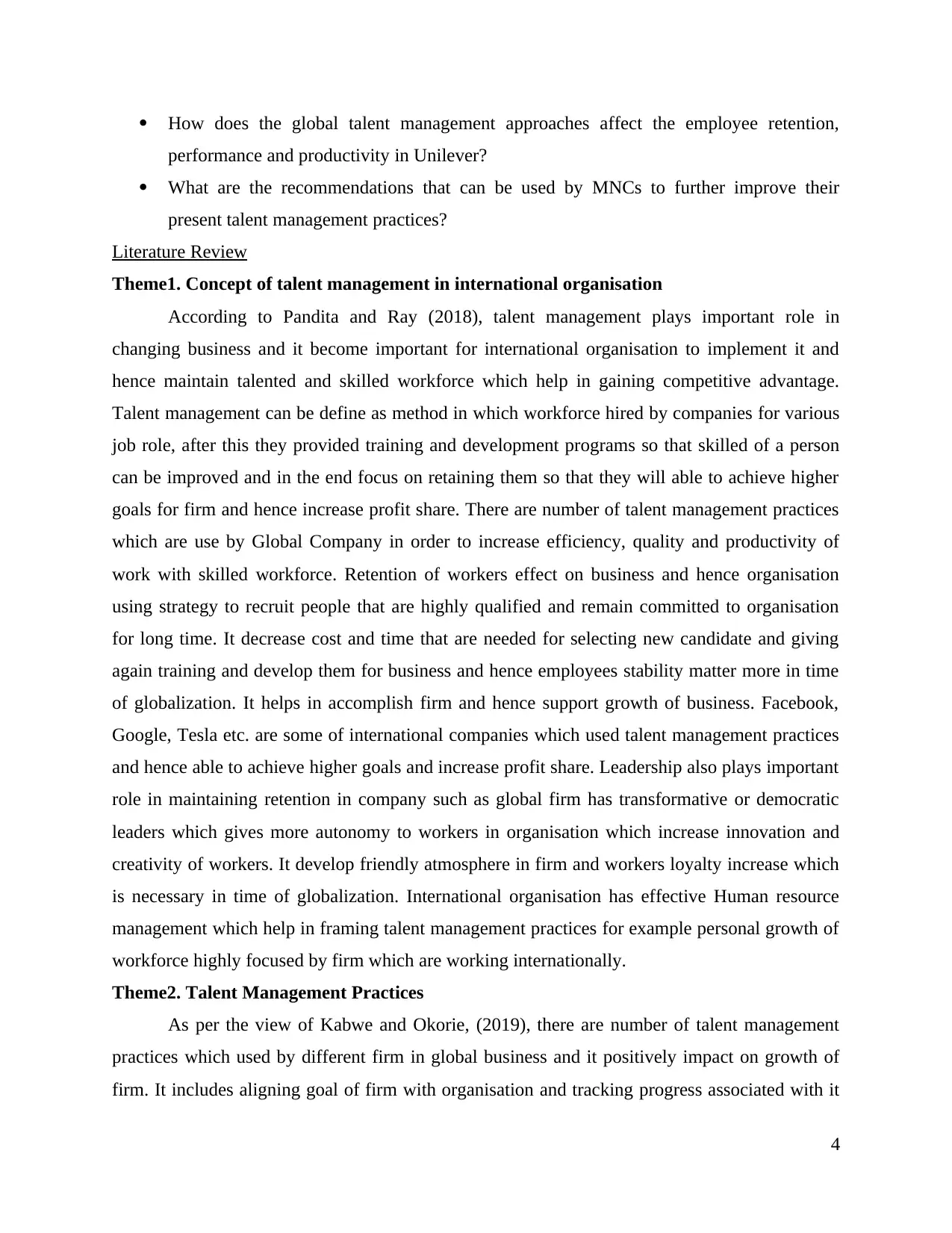
How does the global talent management approaches affect the employee retention,
performance and productivity in Unilever?
What are the recommendations that can be used by MNCs to further improve their
present talent management practices?
Literature Review
Theme1. Concept of talent management in international organisation
According to Pandita and Ray (2018), talent management plays important role in
changing business and it become important for international organisation to implement it and
hence maintain talented and skilled workforce which help in gaining competitive advantage.
Talent management can be define as method in which workforce hired by companies for various
job role, after this they provided training and development programs so that skilled of a person
can be improved and in the end focus on retaining them so that they will able to achieve higher
goals for firm and hence increase profit share. There are number of talent management practices
which are use by Global Company in order to increase efficiency, quality and productivity of
work with skilled workforce. Retention of workers effect on business and hence organisation
using strategy to recruit people that are highly qualified and remain committed to organisation
for long time. It decrease cost and time that are needed for selecting new candidate and giving
again training and develop them for business and hence employees stability matter more in time
of globalization. It helps in accomplish firm and hence support growth of business. Facebook,
Google, Tesla etc. are some of international companies which used talent management practices
and hence able to achieve higher goals and increase profit share. Leadership also plays important
role in maintaining retention in company such as global firm has transformative or democratic
leaders which gives more autonomy to workers in organisation which increase innovation and
creativity of workers. It develop friendly atmosphere in firm and workers loyalty increase which
is necessary in time of globalization. International organisation has effective Human resource
management which help in framing talent management practices for example personal growth of
workforce highly focused by firm which are working internationally.
Theme2. Talent Management Practices
As per the view of Kabwe and Okorie, (2019), there are number of talent management
practices which used by different firm in global business and it positively impact on growth of
firm. It includes aligning goal of firm with organisation and tracking progress associated with it
4
performance and productivity in Unilever?
What are the recommendations that can be used by MNCs to further improve their
present talent management practices?
Literature Review
Theme1. Concept of talent management in international organisation
According to Pandita and Ray (2018), talent management plays important role in
changing business and it become important for international organisation to implement it and
hence maintain talented and skilled workforce which help in gaining competitive advantage.
Talent management can be define as method in which workforce hired by companies for various
job role, after this they provided training and development programs so that skilled of a person
can be improved and in the end focus on retaining them so that they will able to achieve higher
goals for firm and hence increase profit share. There are number of talent management practices
which are use by Global Company in order to increase efficiency, quality and productivity of
work with skilled workforce. Retention of workers effect on business and hence organisation
using strategy to recruit people that are highly qualified and remain committed to organisation
for long time. It decrease cost and time that are needed for selecting new candidate and giving
again training and develop them for business and hence employees stability matter more in time
of globalization. It helps in accomplish firm and hence support growth of business. Facebook,
Google, Tesla etc. are some of international companies which used talent management practices
and hence able to achieve higher goals and increase profit share. Leadership also plays important
role in maintaining retention in company such as global firm has transformative or democratic
leaders which gives more autonomy to workers in organisation which increase innovation and
creativity of workers. It develop friendly atmosphere in firm and workers loyalty increase which
is necessary in time of globalization. International organisation has effective Human resource
management which help in framing talent management practices for example personal growth of
workforce highly focused by firm which are working internationally.
Theme2. Talent Management Practices
As per the view of Kabwe and Okorie, (2019), there are number of talent management
practices which used by different firm in global business and it positively impact on growth of
firm. It includes aligning goal of firm with organisation and tracking progress associated with it
4
Paraphrase This Document
Need a fresh take? Get an instant paraphrase of this document with our AI Paraphraser
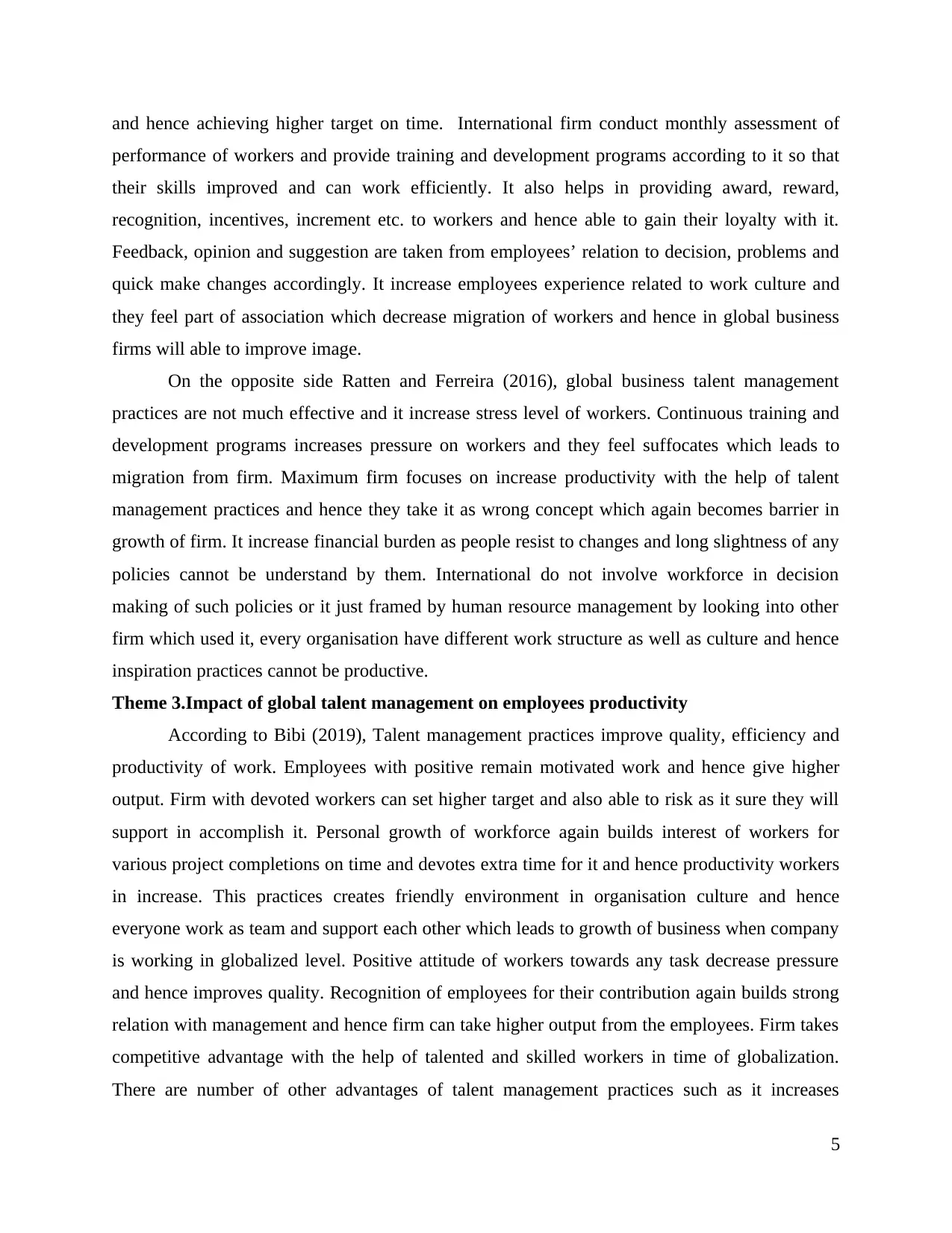
and hence achieving higher target on time. International firm conduct monthly assessment of
performance of workers and provide training and development programs according to it so that
their skills improved and can work efficiently. It also helps in providing award, reward,
recognition, incentives, increment etc. to workers and hence able to gain their loyalty with it.
Feedback, opinion and suggestion are taken from employees’ relation to decision, problems and
quick make changes accordingly. It increase employees experience related to work culture and
they feel part of association which decrease migration of workers and hence in global business
firms will able to improve image.
On the opposite side Ratten and Ferreira (2016), global business talent management
practices are not much effective and it increase stress level of workers. Continuous training and
development programs increases pressure on workers and they feel suffocates which leads to
migration from firm. Maximum firm focuses on increase productivity with the help of talent
management practices and hence they take it as wrong concept which again becomes barrier in
growth of firm. It increase financial burden as people resist to changes and long slightness of any
policies cannot be understand by them. International do not involve workforce in decision
making of such policies or it just framed by human resource management by looking into other
firm which used it, every organisation have different work structure as well as culture and hence
inspiration practices cannot be productive.
Theme 3.Impact of global talent management on employees productivity
According to Bibi (2019), Talent management practices improve quality, efficiency and
productivity of work. Employees with positive remain motivated work and hence give higher
output. Firm with devoted workers can set higher target and also able to risk as it sure they will
support in accomplish it. Personal growth of workforce again builds interest of workers for
various project completions on time and devotes extra time for it and hence productivity workers
in increase. This practices creates friendly environment in organisation culture and hence
everyone work as team and support each other which leads to growth of business when company
is working in globalized level. Positive attitude of workers towards any task decrease pressure
and hence improves quality. Recognition of employees for their contribution again builds strong
relation with management and hence firm can take higher output from the employees. Firm takes
competitive advantage with the help of talented and skilled workers in time of globalization.
There are number of other advantages of talent management practices such as it increases
5
performance of workers and provide training and development programs according to it so that
their skills improved and can work efficiently. It also helps in providing award, reward,
recognition, incentives, increment etc. to workers and hence able to gain their loyalty with it.
Feedback, opinion and suggestion are taken from employees’ relation to decision, problems and
quick make changes accordingly. It increase employees experience related to work culture and
they feel part of association which decrease migration of workers and hence in global business
firms will able to improve image.
On the opposite side Ratten and Ferreira (2016), global business talent management
practices are not much effective and it increase stress level of workers. Continuous training and
development programs increases pressure on workers and they feel suffocates which leads to
migration from firm. Maximum firm focuses on increase productivity with the help of talent
management practices and hence they take it as wrong concept which again becomes barrier in
growth of firm. It increase financial burden as people resist to changes and long slightness of any
policies cannot be understand by them. International do not involve workforce in decision
making of such policies or it just framed by human resource management by looking into other
firm which used it, every organisation have different work structure as well as culture and hence
inspiration practices cannot be productive.
Theme 3.Impact of global talent management on employees productivity
According to Bibi (2019), Talent management practices improve quality, efficiency and
productivity of work. Employees with positive remain motivated work and hence give higher
output. Firm with devoted workers can set higher target and also able to risk as it sure they will
support in accomplish it. Personal growth of workforce again builds interest of workers for
various project completions on time and devotes extra time for it and hence productivity workers
in increase. This practices creates friendly environment in organisation culture and hence
everyone work as team and support each other which leads to growth of business when company
is working in globalized level. Positive attitude of workers towards any task decrease pressure
and hence improves quality. Recognition of employees for their contribution again builds strong
relation with management and hence firm can take higher output from the employees. Firm takes
competitive advantage with the help of talented and skilled workers in time of globalization.
There are number of other advantages of talent management practices such as it increases
5
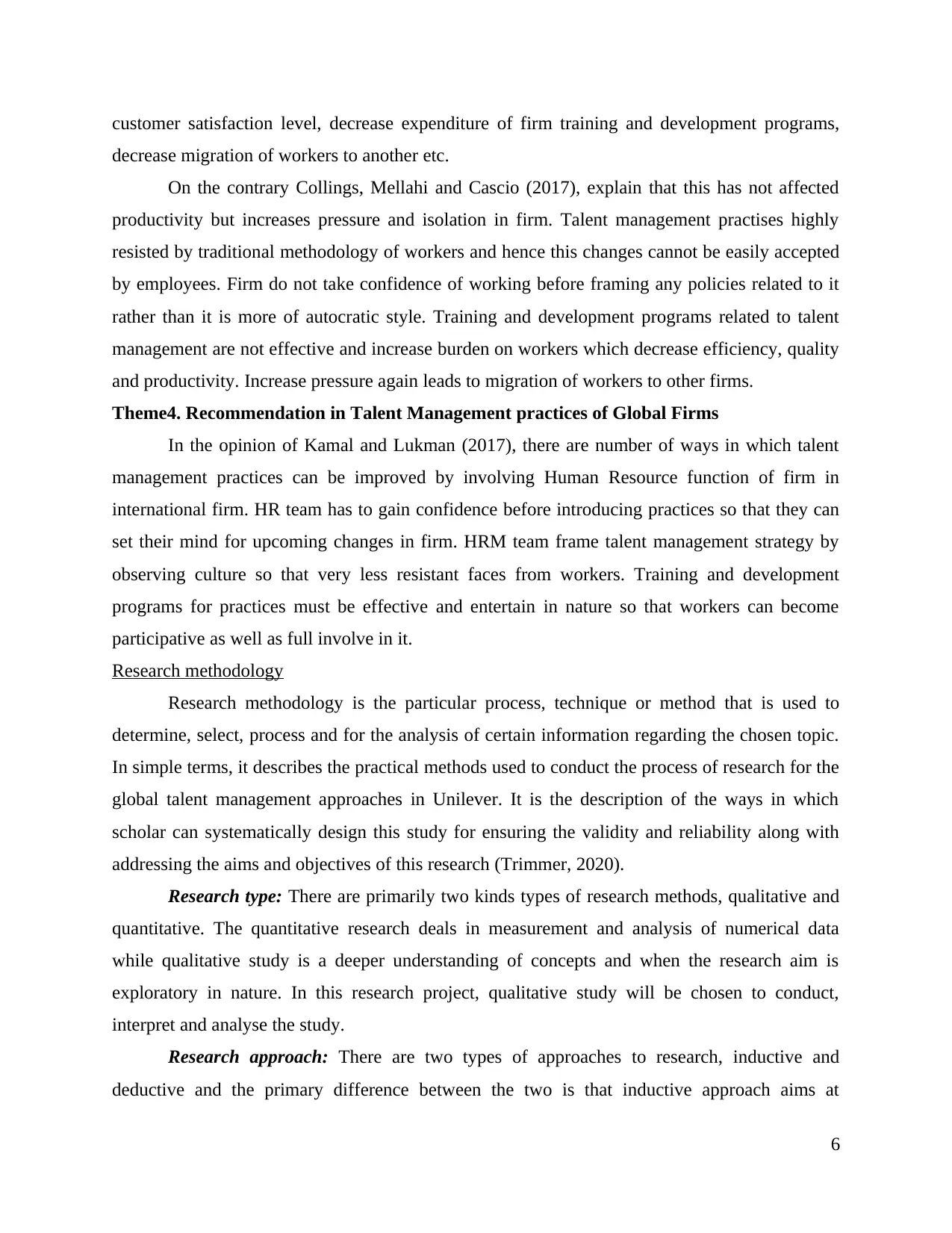
customer satisfaction level, decrease expenditure of firm training and development programs,
decrease migration of workers to another etc.
On the contrary Collings, Mellahi and Cascio (2017), explain that this has not affected
productivity but increases pressure and isolation in firm. Talent management practises highly
resisted by traditional methodology of workers and hence this changes cannot be easily accepted
by employees. Firm do not take confidence of working before framing any policies related to it
rather than it is more of autocratic style. Training and development programs related to talent
management are not effective and increase burden on workers which decrease efficiency, quality
and productivity. Increase pressure again leads to migration of workers to other firms.
Theme4. Recommendation in Talent Management practices of Global Firms
In the opinion of Kamal and Lukman (2017), there are number of ways in which talent
management practices can be improved by involving Human Resource function of firm in
international firm. HR team has to gain confidence before introducing practices so that they can
set their mind for upcoming changes in firm. HRM team frame talent management strategy by
observing culture so that very less resistant faces from workers. Training and development
programs for practices must be effective and entertain in nature so that workers can become
participative as well as full involve in it.
Research methodology
Research methodology is the particular process, technique or method that is used to
determine, select, process and for the analysis of certain information regarding the chosen topic.
In simple terms, it describes the practical methods used to conduct the process of research for the
global talent management approaches in Unilever. It is the description of the ways in which
scholar can systematically design this study for ensuring the validity and reliability along with
addressing the aims and objectives of this research (Trimmer, 2020).
Research type: There are primarily two kinds types of research methods, qualitative and
quantitative. The quantitative research deals in measurement and analysis of numerical data
while qualitative study is a deeper understanding of concepts and when the research aim is
exploratory in nature. In this research project, qualitative study will be chosen to conduct,
interpret and analyse the study.
Research approach: There are two types of approaches to research, inductive and
deductive and the primary difference between the two is that inductive approach aims at
6
decrease migration of workers to another etc.
On the contrary Collings, Mellahi and Cascio (2017), explain that this has not affected
productivity but increases pressure and isolation in firm. Talent management practises highly
resisted by traditional methodology of workers and hence this changes cannot be easily accepted
by employees. Firm do not take confidence of working before framing any policies related to it
rather than it is more of autocratic style. Training and development programs related to talent
management are not effective and increase burden on workers which decrease efficiency, quality
and productivity. Increase pressure again leads to migration of workers to other firms.
Theme4. Recommendation in Talent Management practices of Global Firms
In the opinion of Kamal and Lukman (2017), there are number of ways in which talent
management practices can be improved by involving Human Resource function of firm in
international firm. HR team has to gain confidence before introducing practices so that they can
set their mind for upcoming changes in firm. HRM team frame talent management strategy by
observing culture so that very less resistant faces from workers. Training and development
programs for practices must be effective and entertain in nature so that workers can become
participative as well as full involve in it.
Research methodology
Research methodology is the particular process, technique or method that is used to
determine, select, process and for the analysis of certain information regarding the chosen topic.
In simple terms, it describes the practical methods used to conduct the process of research for the
global talent management approaches in Unilever. It is the description of the ways in which
scholar can systematically design this study for ensuring the validity and reliability along with
addressing the aims and objectives of this research (Trimmer, 2020).
Research type: There are primarily two kinds types of research methods, qualitative and
quantitative. The quantitative research deals in measurement and analysis of numerical data
while qualitative study is a deeper understanding of concepts and when the research aim is
exploratory in nature. In this research project, qualitative study will be chosen to conduct,
interpret and analyse the study.
Research approach: There are two types of approaches to research, inductive and
deductive and the primary difference between the two is that inductive approach aims at
6
⊘ This is a preview!⊘
Do you want full access?
Subscribe today to unlock all pages.

Trusted by 1+ million students worldwide
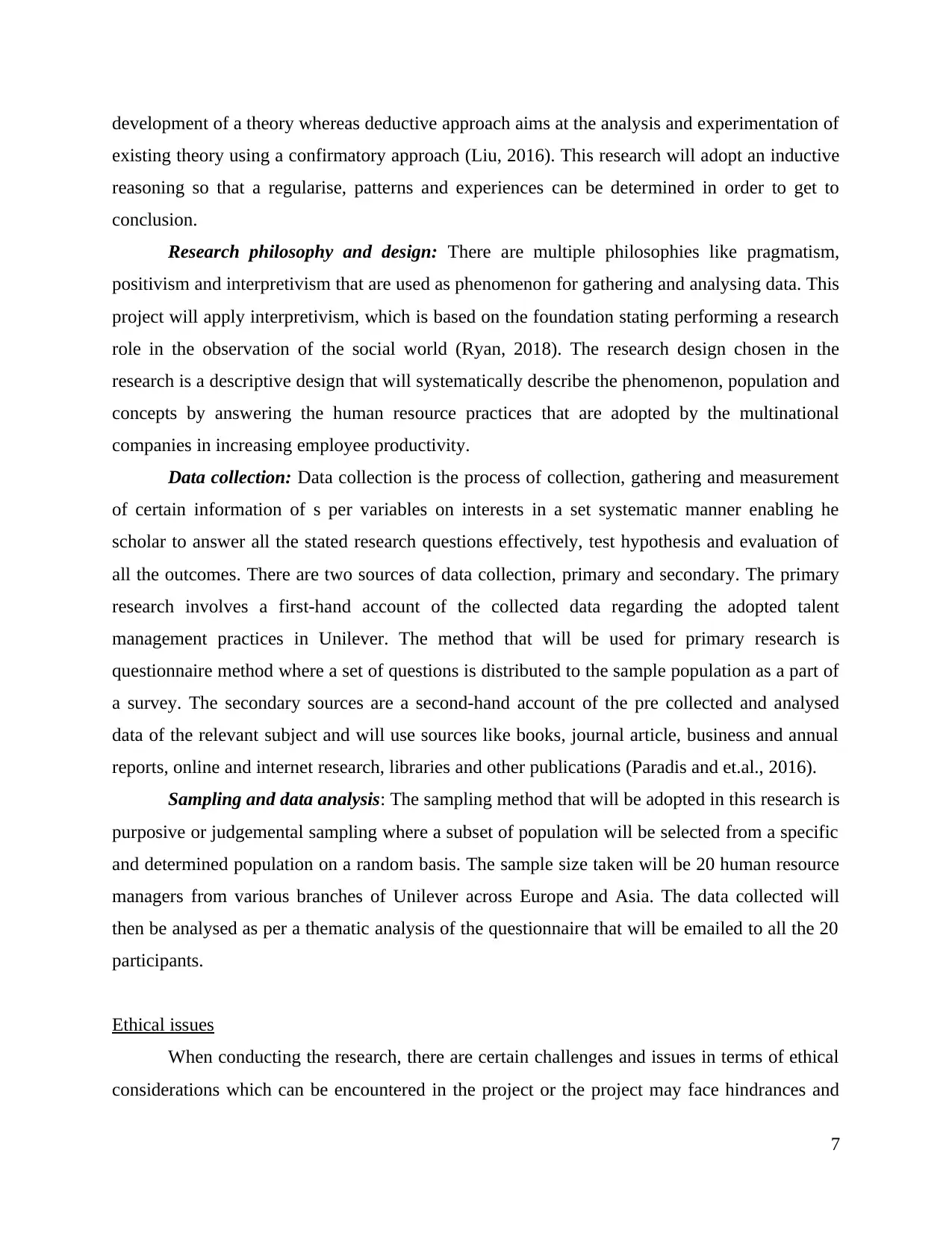
development of a theory whereas deductive approach aims at the analysis and experimentation of
existing theory using a confirmatory approach (Liu, 2016). This research will adopt an inductive
reasoning so that a regularise, patterns and experiences can be determined in order to get to
conclusion.
Research philosophy and design: There are multiple philosophies like pragmatism,
positivism and interpretivism that are used as phenomenon for gathering and analysing data. This
project will apply interpretivism, which is based on the foundation stating performing a research
role in the observation of the social world (Ryan, 2018). The research design chosen in the
research is a descriptive design that will systematically describe the phenomenon, population and
concepts by answering the human resource practices that are adopted by the multinational
companies in increasing employee productivity.
Data collection: Data collection is the process of collection, gathering and measurement
of certain information of s per variables on interests in a set systematic manner enabling he
scholar to answer all the stated research questions effectively, test hypothesis and evaluation of
all the outcomes. There are two sources of data collection, primary and secondary. The primary
research involves a first-hand account of the collected data regarding the adopted talent
management practices in Unilever. The method that will be used for primary research is
questionnaire method where a set of questions is distributed to the sample population as a part of
a survey. The secondary sources are a second-hand account of the pre collected and analysed
data of the relevant subject and will use sources like books, journal article, business and annual
reports, online and internet research, libraries and other publications (Paradis and et.al., 2016).
Sampling and data analysis: The sampling method that will be adopted in this research is
purposive or judgemental sampling where a subset of population will be selected from a specific
and determined population on a random basis. The sample size taken will be 20 human resource
managers from various branches of Unilever across Europe and Asia. The data collected will
then be analysed as per a thematic analysis of the questionnaire that will be emailed to all the 20
participants.
Ethical issues
When conducting the research, there are certain challenges and issues in terms of ethical
considerations which can be encountered in the project or the project may face hindrances and
7
existing theory using a confirmatory approach (Liu, 2016). This research will adopt an inductive
reasoning so that a regularise, patterns and experiences can be determined in order to get to
conclusion.
Research philosophy and design: There are multiple philosophies like pragmatism,
positivism and interpretivism that are used as phenomenon for gathering and analysing data. This
project will apply interpretivism, which is based on the foundation stating performing a research
role in the observation of the social world (Ryan, 2018). The research design chosen in the
research is a descriptive design that will systematically describe the phenomenon, population and
concepts by answering the human resource practices that are adopted by the multinational
companies in increasing employee productivity.
Data collection: Data collection is the process of collection, gathering and measurement
of certain information of s per variables on interests in a set systematic manner enabling he
scholar to answer all the stated research questions effectively, test hypothesis and evaluation of
all the outcomes. There are two sources of data collection, primary and secondary. The primary
research involves a first-hand account of the collected data regarding the adopted talent
management practices in Unilever. The method that will be used for primary research is
questionnaire method where a set of questions is distributed to the sample population as a part of
a survey. The secondary sources are a second-hand account of the pre collected and analysed
data of the relevant subject and will use sources like books, journal article, business and annual
reports, online and internet research, libraries and other publications (Paradis and et.al., 2016).
Sampling and data analysis: The sampling method that will be adopted in this research is
purposive or judgemental sampling where a subset of population will be selected from a specific
and determined population on a random basis. The sample size taken will be 20 human resource
managers from various branches of Unilever across Europe and Asia. The data collected will
then be analysed as per a thematic analysis of the questionnaire that will be emailed to all the 20
participants.
Ethical issues
When conducting the research, there are certain challenges and issues in terms of ethical
considerations which can be encountered in the project or the project may face hindrances and
7
Paraphrase This Document
Need a fresh take? Get an instant paraphrase of this document with our AI Paraphraser
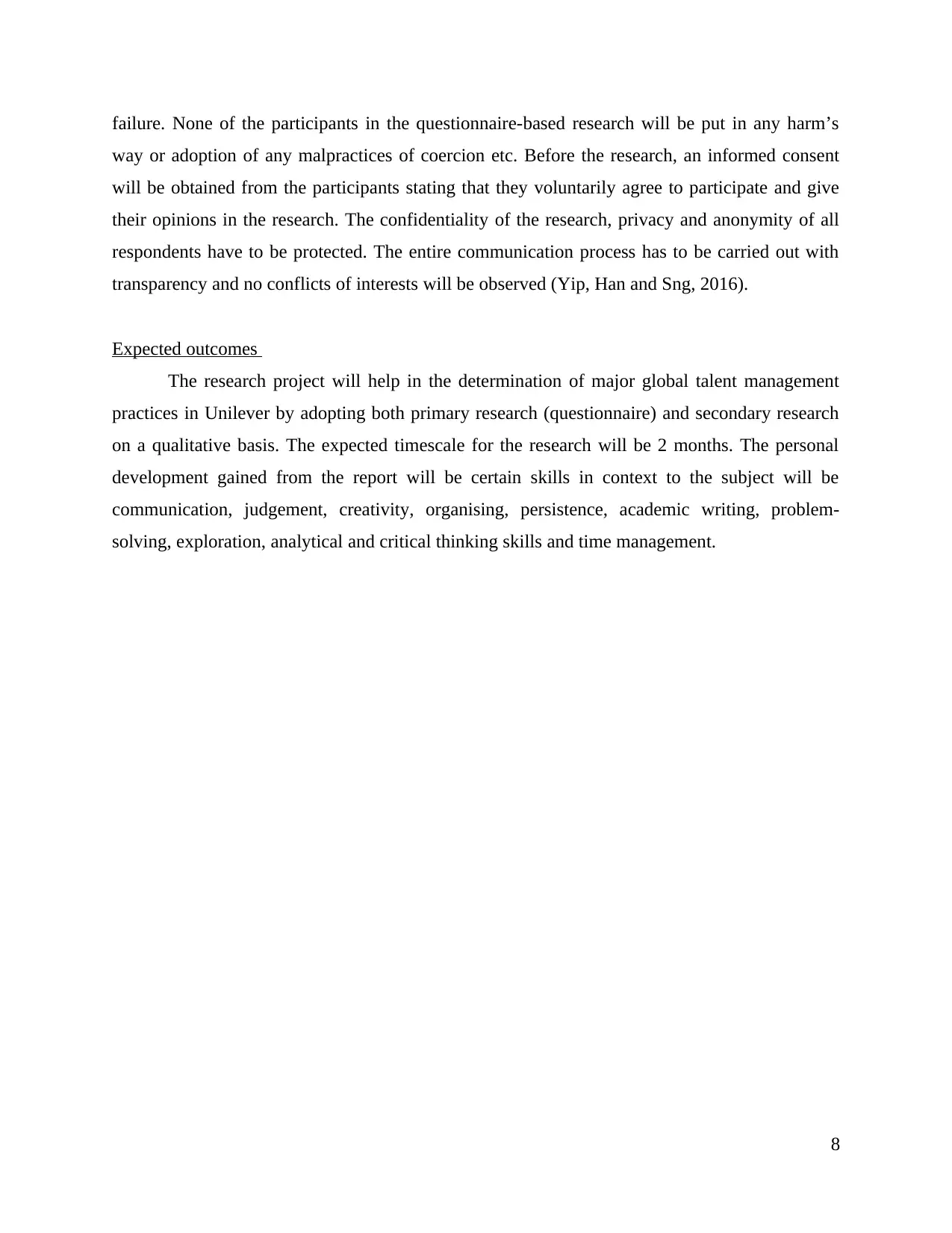
failure. None of the participants in the questionnaire-based research will be put in any harm’s
way or adoption of any malpractices of coercion etc. Before the research, an informed consent
will be obtained from the participants stating that they voluntarily agree to participate and give
their opinions in the research. The confidentiality of the research, privacy and anonymity of all
respondents have to be protected. The entire communication process has to be carried out with
transparency and no conflicts of interests will be observed (Yip, Han and Sng, 2016).
Expected outcomes
The research project will help in the determination of major global talent management
practices in Unilever by adopting both primary research (questionnaire) and secondary research
on a qualitative basis. The expected timescale for the research will be 2 months. The personal
development gained from the report will be certain skills in context to the subject will be
communication, judgement, creativity, organising, persistence, academic writing, problem-
solving, exploration, analytical and critical thinking skills and time management.
8
way or adoption of any malpractices of coercion etc. Before the research, an informed consent
will be obtained from the participants stating that they voluntarily agree to participate and give
their opinions in the research. The confidentiality of the research, privacy and anonymity of all
respondents have to be protected. The entire communication process has to be carried out with
transparency and no conflicts of interests will be observed (Yip, Han and Sng, 2016).
Expected outcomes
The research project will help in the determination of major global talent management
practices in Unilever by adopting both primary research (questionnaire) and secondary research
on a qualitative basis. The expected timescale for the research will be 2 months. The personal
development gained from the report will be certain skills in context to the subject will be
communication, judgement, creativity, organising, persistence, academic writing, problem-
solving, exploration, analytical and critical thinking skills and time management.
8
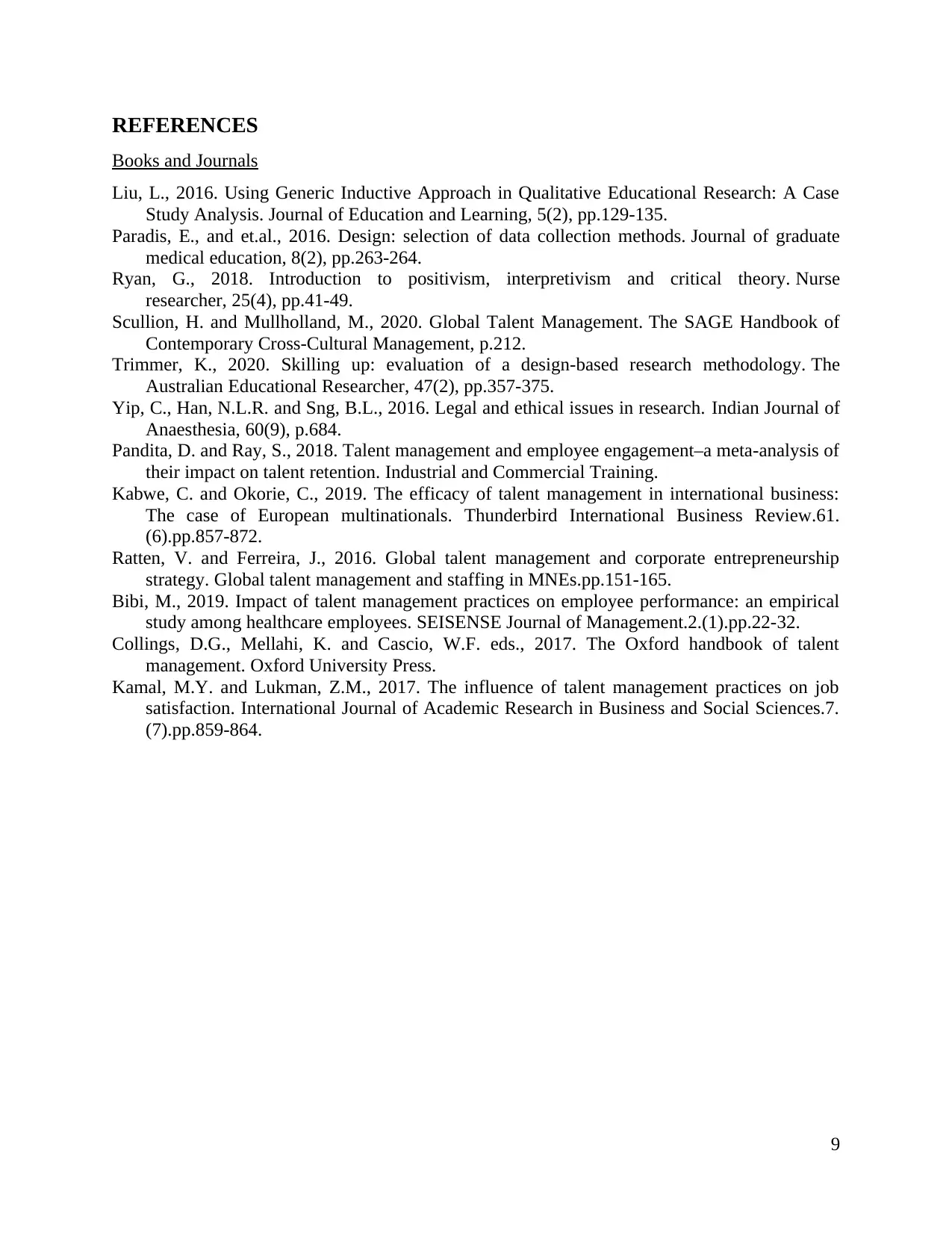
REFERENCES
Books and Journals
Liu, L., 2016. Using Generic Inductive Approach in Qualitative Educational Research: A Case
Study Analysis. Journal of Education and Learning, 5(2), pp.129-135.
Paradis, E., and et.al., 2016. Design: selection of data collection methods. Journal of graduate
medical education, 8(2), pp.263-264.
Ryan, G., 2018. Introduction to positivism, interpretivism and critical theory. Nurse
researcher, 25(4), pp.41-49.
Scullion, H. and Mullholland, M., 2020. Global Talent Management. The SAGE Handbook of
Contemporary Cross-Cultural Management, p.212.
Trimmer, K., 2020. Skilling up: evaluation of a design-based research methodology. The
Australian Educational Researcher, 47(2), pp.357-375.
Yip, C., Han, N.L.R. and Sng, B.L., 2016. Legal and ethical issues in research. Indian Journal of
Anaesthesia, 60(9), p.684.
Pandita, D. and Ray, S., 2018. Talent management and employee engagement–a meta-analysis of
their impact on talent retention. Industrial and Commercial Training.
Kabwe, C. and Okorie, C., 2019. The efficacy of talent management in international business:
The case of European multinationals. Thunderbird International Business Review.61.
(6).pp.857-872.
Ratten, V. and Ferreira, J., 2016. Global talent management and corporate entrepreneurship
strategy. Global talent management and staffing in MNEs.pp.151-165.
Bibi, M., 2019. Impact of talent management practices on employee performance: an empirical
study among healthcare employees. SEISENSE Journal of Management.2.(1).pp.22-32.
Collings, D.G., Mellahi, K. and Cascio, W.F. eds., 2017. The Oxford handbook of talent
management. Oxford University Press.
Kamal, M.Y. and Lukman, Z.M., 2017. The influence of talent management practices on job
satisfaction. International Journal of Academic Research in Business and Social Sciences.7.
(7).pp.859-864.
9
Books and Journals
Liu, L., 2016. Using Generic Inductive Approach in Qualitative Educational Research: A Case
Study Analysis. Journal of Education and Learning, 5(2), pp.129-135.
Paradis, E., and et.al., 2016. Design: selection of data collection methods. Journal of graduate
medical education, 8(2), pp.263-264.
Ryan, G., 2018. Introduction to positivism, interpretivism and critical theory. Nurse
researcher, 25(4), pp.41-49.
Scullion, H. and Mullholland, M., 2020. Global Talent Management. The SAGE Handbook of
Contemporary Cross-Cultural Management, p.212.
Trimmer, K., 2020. Skilling up: evaluation of a design-based research methodology. The
Australian Educational Researcher, 47(2), pp.357-375.
Yip, C., Han, N.L.R. and Sng, B.L., 2016. Legal and ethical issues in research. Indian Journal of
Anaesthesia, 60(9), p.684.
Pandita, D. and Ray, S., 2018. Talent management and employee engagement–a meta-analysis of
their impact on talent retention. Industrial and Commercial Training.
Kabwe, C. and Okorie, C., 2019. The efficacy of talent management in international business:
The case of European multinationals. Thunderbird International Business Review.61.
(6).pp.857-872.
Ratten, V. and Ferreira, J., 2016. Global talent management and corporate entrepreneurship
strategy. Global talent management and staffing in MNEs.pp.151-165.
Bibi, M., 2019. Impact of talent management practices on employee performance: an empirical
study among healthcare employees. SEISENSE Journal of Management.2.(1).pp.22-32.
Collings, D.G., Mellahi, K. and Cascio, W.F. eds., 2017. The Oxford handbook of talent
management. Oxford University Press.
Kamal, M.Y. and Lukman, Z.M., 2017. The influence of talent management practices on job
satisfaction. International Journal of Academic Research in Business and Social Sciences.7.
(7).pp.859-864.
9
⊘ This is a preview!⊘
Do you want full access?
Subscribe today to unlock all pages.

Trusted by 1+ million students worldwide
1 out of 9
Related Documents
Your All-in-One AI-Powered Toolkit for Academic Success.
+13062052269
info@desklib.com
Available 24*7 on WhatsApp / Email
![[object Object]](/_next/static/media/star-bottom.7253800d.svg)
Unlock your academic potential
Copyright © 2020–2026 A2Z Services. All Rights Reserved. Developed and managed by ZUCOL.




